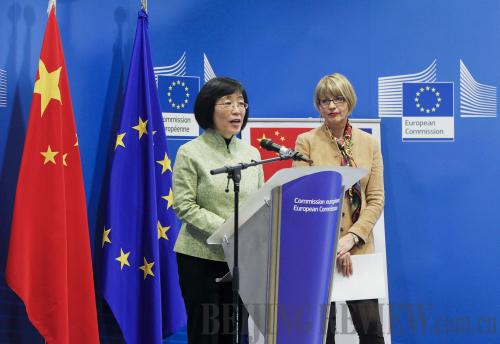|
 |
|
Yang Yanyi , head of the Chinese Mission to the EU, addresses a reception held in Brussels on May 6 to commemorate the 40th anniversary of the establishment of diplomatic ties between China and the EU (XINHUA) |

The linear distance from Beijing to Brussels measures about 7,970 km, farther than that to Moscow while a little shorter than that to Washington. On a winter's night in 1974, European Commissioner for External Relations Christopher Soames hosted a banquet for the then Chinese ambassador to Belgium Li Lianbi in a suburb of Brussels and proposed the establishment of official diplomacy between the European Community and China.
Soames paid a visit to China in 1975 and both sides signed an agreement on establishing official diplomatic relations. Since then, with the direct link between Beijing and Brussels, a new chapter of exchange and cooperation was opened between China and Europe. In the four decades since, after overcoming all manner of hardships, Sino-European relations have deepened.
Evolving relations
Forty years ago, the European Community has established itself as a rich, prosperous and developed bloc of countries. Everyday electronic appliances used by ordinary families in the European countries at that time would have seemed like something out of a science fiction for the vast majority of the Chinese people. Back then, China was doing its utmost to rid itself of poverty that had plagued the nation for a quarter of a century and its economic corpus was badly in need of boosts in capital and technology. The Chinese people looked to their European counterparts with their modern buildings and conveniences, and dreamt of a lifestyle they might too enjoy one day.
Fast-forward to today, the roles have arguably been reversed when the European Union (EU) is faced with declining competitiveness and aging industries. The project of European integration so feted in the past now faces doubt and cynicism. The welfare systems of many EU member countries have been beset by malignant expansion. In contrast, China has become a new world factory with the Made-in-China tag being omnipresent in foreign markets. China's overseas investment is also blossoming. Sophisticated high-speed railway technology and the Internet industry now represent the country's new calling cards.
In the annual tech trade fair CeBit in Hanover this year, Jack Ma, Alibaba founder and chairman of the company's board of directors, was given the honor of delivering a speech on behalf of entrepreneurs worldwide. At the Milan Expo currently ongoing in Italy, China is also the largest country in terms of occupying general exhibition space. In recent years, a craze for learning Mandarin has washed over Europe. More and more Europeans are coming to study in China with a desire to keep a finger on the pulse of the world's second largest economy and to benefit from the tremendous opportunities the country presents, both personally and career-wise.
With China's rapid development, China and the EU are now on a more equal footing. Urbanization and the green industry have opened up new vistas for China-EU cooperation while the promotion and enforcement of legal standards in the Chinese market have now created a more amenable environment for this to happen.
Meanwhile, continually increasing Chinese investment in the EU market will also help redress bilateral trade imbalance between the two sides, contributing to the EU's offsetting of bad assets, injecting fresh blood and vitality into European industrial development in much the same manner as European business and investors did for China 40 years ago. Bilateral trade volume between China and EU countries now stands at $600 billion, compared to initial $2.4 billion at the outset of the relationship. Now both parties are striding toward the goal of reaching $1 trillion by 2020. In the face of the massive opportunities engendered by China's development, EU countries, historically the world's most mercantilist economies, are hardly likely to let their chance slip from their grasp.
Beyond bilateral cooperation
The thriving of China-EU relations has come about as a result of an ever-fluctuating global situation that has provided an impetus to reshape the international order. The detente of Sino-U.S. relations and the loosened bipolar structure in the 1970s have contributed to the sooner-than-expected flourishing of China-EU relations. In the 1990s, the boom in the Chinese economy together with the evolution of the European Community into the EU brought China-EU cooperation to new heights.
Since the dawn of the 21st century, the international situation has undergone a series of profound changes with emerging economies rising rapidly and the stalwart economies of the United States and European countries becoming entangled in a seemingly never-ending loop of economic and debt crises. The increasing diversity and unbalanced development of the world are also subtly changing the way that Europe views China. The European Commission has successively released a series of policy documents since 2001, including The EU's China Policy, A Maturing Partnership-Shared Interests and Challenges in EU-China Relations, Competition and Partnership: A Policy for EU-China Trade and Investment, and EU-China: Closer Partners, Growing Responsibilities. It is hoped that from a European perspective, China may no longer be merely a partner in economic cooperation but also a valued friend.
The signs are certainly promising. Within the UN framework, China and the EU have made joint efforts in safeguarding world peace, eliminating poverty and achieving sustainable development. The two sides have also worked together to address the global financial crisis and to promote global economic growth within the framework of G20. In non-traditional security fields such as climate change, anti-terrorism and Internet security, China and the EU have made progress with pragmatic cooperation. In joining the Asian Infrastructure Investment Bank, Europe has also tacitly voted for the new international economic order advocated by China.
Benefiting mankind
In recent years, China-EU relations have been placed on the fast track. In November 2013, the two sides jointly adopted the China-EU 2020 Strategic Agenda for Cooperation. Chinese investment in the EU market has grown rapidly in recent years. In the first two months of 2015, investment to the EU from the Chinese mainland reached $3.36 billion, 10.5 times that of the same period of last year. Trade imbalance is no longer a major issue. China-EU bilateral investment negotiations and the possible future Free Trade Agreement (FTA) negotiations have shown the breadth and depth of the present relationship.
At present, China is attempting to implement the Belt and Road Initiatives, which is in concert with the EU development agenda, given their shared aim of boosting growth and increasing employment.
Going forward, the further development of the China-EU relations would be mutually beneficial. The gargantuan Chinese market will facilitate the EU in extricating itself from its debt crisis and in restoring faith in European integration, while the experience garnered by the EU will no doubt prove useful in helping China avoid the middle-income trap and enter into the ranks of the high-income countries.
Economically, with Eurasian interconnectivity as the linkage, EU technology and service, combined with China's numerous industrial clusters, could result in balanced growth across the table, effectively forging a new engine for global growth. Politically, China and the EU can have in-depth discussions and exchange views on peace, development and global matters on the basis of the principles of sincerity and good faith. In cultural terms, the two sides are committed to people-to-people exchanges, especially those between young people, and trying to defuse tensions in order to lay a solid foundation for a long-term and sound relationship.
It is true that the mentalities of both China and the EU are undergoing subtle changes; therefore profound challenges are constantly arising in relations between the two. China's upgrading of its industrial structure and Europe's economic slowdown will intensify competition between the two in the global market.
The level of trust between the two politically is far from ideal due to the persistence of ideological biases toward China in the EU. More patience and tolerance will be required on behalf of both sides.
The past four decades have witnessed the two sides breaking free from the numerous chains that have long hindered the development of bilateral ties. Thus, it is foreseeable that bilateral cooperation might be further expanded over the next 40 or 50 years. Though Brussels may be distant in relation to Beijing geographically, the mindset of both parties with regard to achieving common prosperity is growing ever closer.
The author is an assistant researcher with the China Institutes of Contemporary International Relations
Copyedited by Eric Daly
Comments to liuyunyun@bjreview.com | 